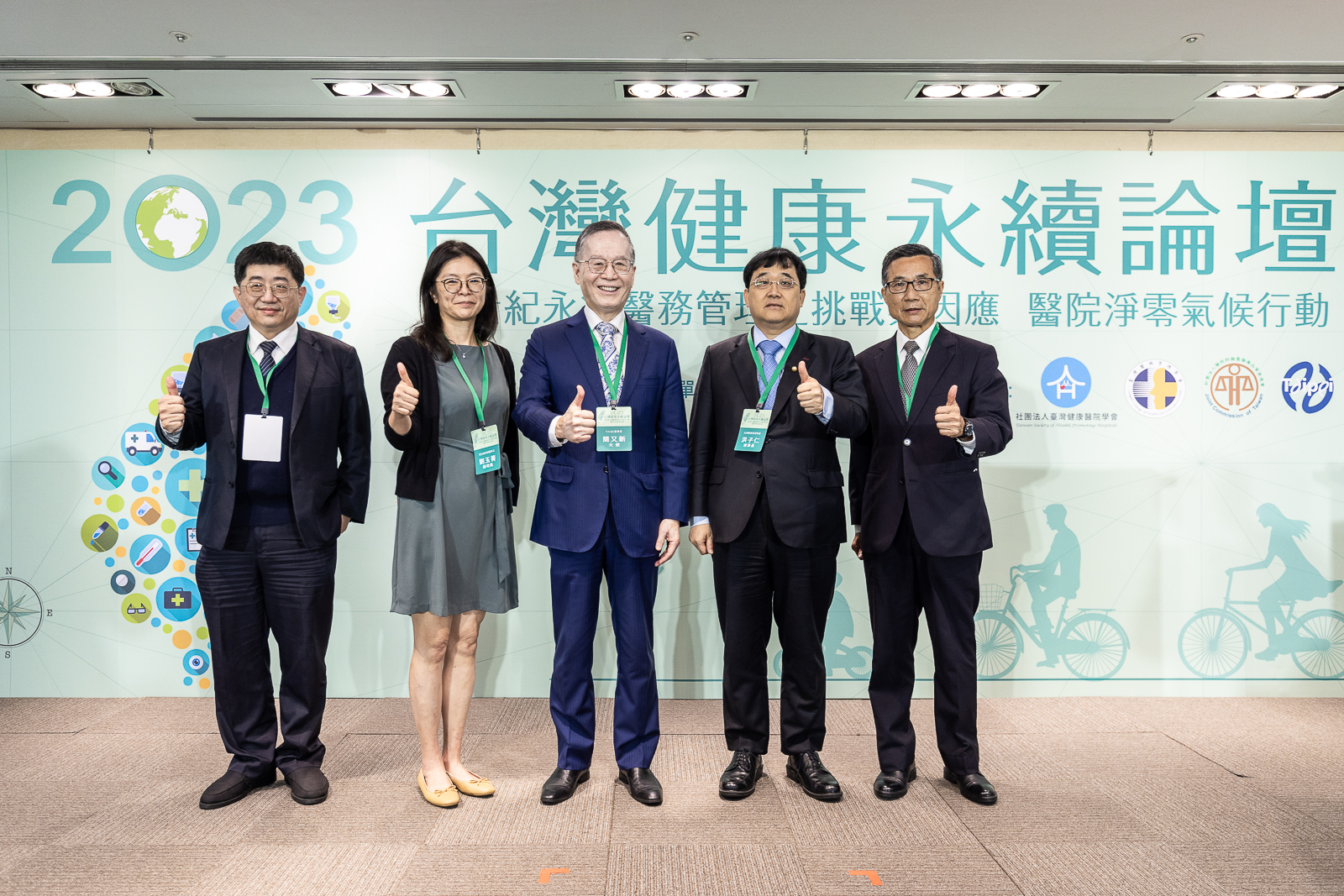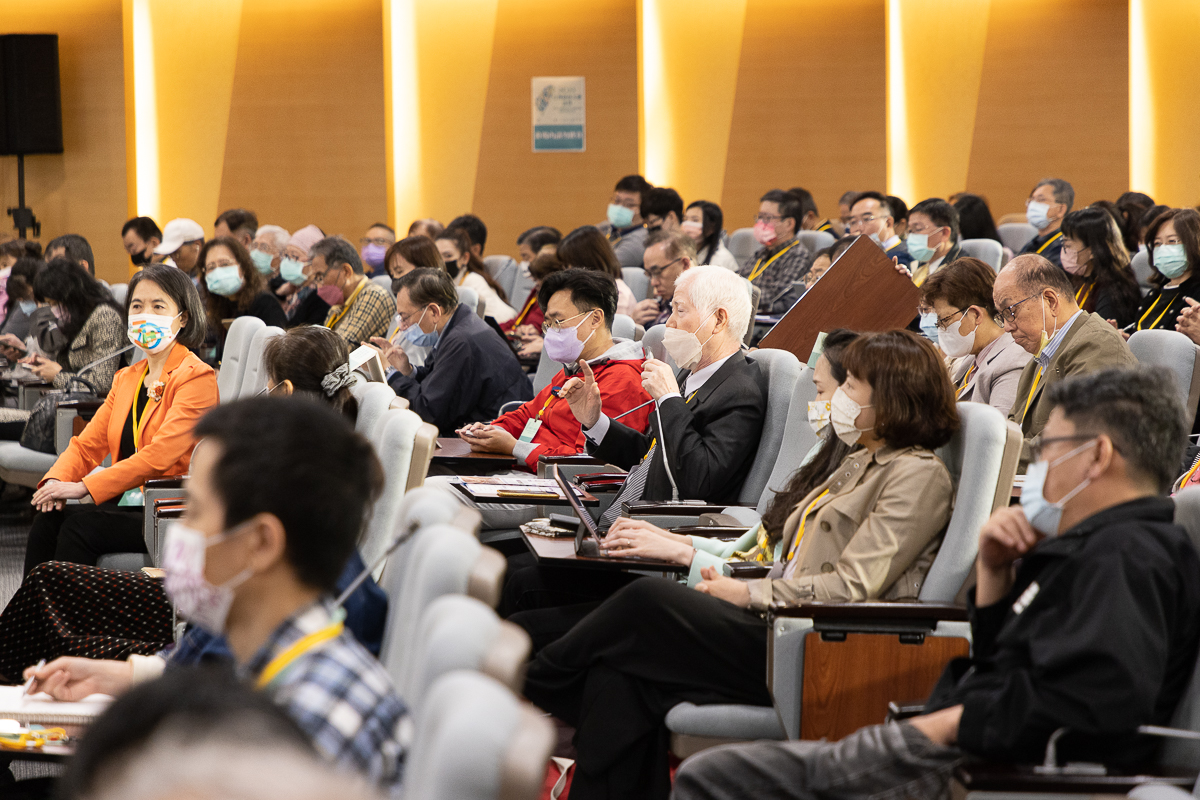News
Category
The 2023 Taiwan Health Sustainability Forum concluded wonderfully
The climate champions of the health sector, whose contributions support an indispensable piece of the puzzle in transitioning towards net zero, were remarkable
In the face of intensifying climate change, evidently threatening global ecosystems and human health, how can medical institutions more actively take action on net-zero initiatives? The 2023 Taiwan Health and Sustainability Forum, organized by the Taiwan Institute for Sustainable Energy (TAISE), took place on Thursday, March 30th at the Chang Yung-Fa Foundation International Conference Center. It involved governments, health professionals and scholars sharing their expertise and engaging in discussions around the challenges and responses to sustainable medical management in the new century, including a vision of net zero emissions, promotion of associated policies and strategies, hospital management practices, etc., to attract an audience of more than 400 participants in-person and online.
The forum was divided into morning and afternoon sessions, respectively discussing ‘developments in the trend of domestic and foreign medical institutions promoting net zero climate action’ and ‘the practice and results of domestic hospitals promoting net zero climate action’. Speakers included the Deputy Director of the Medical Affairs Department of the Ministry of Health and Welfare Director Liu Yujing, Chairman of the Taiwan Institute for Sustainable Energy Dr. Eugene Chien, Chairman of Taiwan Medical Management Association and Executive Vice President of Shin Kong Hospital Hong Ziren, President of the Taipei Chang Gung Memorial Hospital Huang Jiren, Vice President of the Dalin Tzu Chi Hospital Lin Mingnan, Vice President of the Taiwan Adventist Hospital Zhuo Yingxiang, Director of the Hospital of Traditional Chinese Medicine Affiliated with Kaohsiung Medical University Huang Jianmin, and others introduced leading trends and practical results in the notion of net zero.
Hard truths are the starting points for change
According to data from Health Care Without Harm (HCWH), the global medical system contributed about 2 billion tons of greenhouse gas emissions in 2014, accounting for 4.4% of total global emissions - equivalent to the annual output of 514 coal-fired power plants. Greenhouse gas emissions from medical institutions in Taiwan account for about 4.6% of the country's total emissions, which is higher than the global average. Research conducted by the Taiwan Green Productivity Foundation also pointed out that in 2021, among the energy consumption of domestic non-production industries, hospitals ranked first and accounted for about 16.09% of emissions, higher than 13.54% for transport stations and railways, and 12.34% for schools.
"This is a hard truth to face," said Liu Yujing, Deputy Director of the Medical Affairs Department of the Ministry of Health and Welfare. Climate change directly and indirectly threatens people's health and burdens the medical system. For example, heat waves, air pollution, and disease contagion all present various health hazards. "We already knew that SDGs and ESG are important, but the feeling of medical institutions [playing a role] was far away. It was not until these statistics were shared that we now more deeply feel the heavy responsibility we bear."
Liu Yujing expressed that achieving net-zero emissions has already become the objective and trend of many countries, and relevant sustainability policies are promoted from the top-down. The GDP ratio of national medical expenditure and the domestic ratio of greenhouse gas emissions of the medical system are also highly positively correlated. In particular, developed countries are under greater pressure to promote net zero healthcare systems. For instance, the British National Health Service (NHS) is the first national health authority in the world to set net zero goals and policies. The White House and the Department of Health and Human Services (HHS) of the United States have similarly called on several health departments and various field units to sign climate change response commitments and act.
But what is Taiwan going to do? Liu Yujing believes that it is very important to understand one's own position first. The average greenhouse gas emission per capita of Taiwan's medical system workers is 0.52 metric tons and relatively high compared to other countries, meaning there is still a lot of room for improvement. The Ministry of Health and Welfare will provide different degrees of corresponding guidance based on the introduction of greenhouse gas inventory and energy management certification in domestic medical institutions in order to promote the domestic medical system’s transition towards net zero emissions.
‘Green Inflation’ Brings Management Challenges and Risks
At a time when the world is striving for net-zero emissions by 2050, Taiwan recently officially passed the Climate Change Response Act. It is currently the eighteenth country in the world to incorporate the 2050 net-zero goal into law. Carbon fees are a major focus of attention. Dr. Eugene Chien, Chairman of the Taiwan Institute for Sustainable Energy, said that the collection of carbon fees in the future will have a comprehensive impact, and health and medical institutions should not ignore the risk of ‘green inflation’ to demonstrate more positive actions in the process of net zero transformation. The sooner you invest in carbon reduction, the better.
Many speakers at the event also mentioned that the first step towards sustainable health and medical institutions starts from the leadership and drives implementation from top to bottom. As stated in the Climate Smart Healthcare initiative, leadership and governance is at the center of all action. This also points out an obvious truth: in the order of implementing ESG, governance usually takes the first step, while the environment is the most needed yet most difficult to improve.
Taking the electricity consumption of domestic hospitals in 2020 as an example, with hospitals as major electricity consumers, the top three sources of power consumption are air-conditioning equipment (57.66%), lighting equipment (13.81%), and elevator equipment (5.83%). Other sources such as the management and recycling of water resources and the classification, treatment and reduction of medical waste also constitute environmental challenges.
What cannot be ignored is that in order to take care of patients and improve their health, medical institutions need to make choices between original priorities such as ‘infection control’ and the latest priorities like ‘energy conservation and carbon reduction’. It can be said that due to this trade-off in their work towards attaining net zero, they will inevitably face short-term difficulties.
Dr. Eugene Chien proposed ten tips for hospital energy conservation and carbon reduction, covering different aspects such as leadership, procurement, transportation, chemicals, waste, medicine, energy, construction, food and water. He also cited the recommendations of the World Economic Forum (WEF), including using renewable energy and improving energy efficiency, providing digital telemedicine, low-carbon supply chain incentives, improving medical efficiency through preventive medicine, and working with partners. All contribute to reducing the carbon footprint of the healthcare industry.
Chen Yongren, Secretary-General of TAISE, also shared seven actions of the HCWH initiative, such as investing in zero-emission buildings and infrastructure, providing healthy and sustainable food, encouraging the production of low-carbon pharmaceuticals, implementing sustainable waste management, and establishing a more efficient medical structure.
Striving Towards Sustainable Health and a Commitment to ESG
Hong Ziren, Chairman of the Taiwan Medical Management Association and Executive Vice President of Shin Kong Hospital, added and emphasized, "health is an investment, not a cost." By comparing the output of medical services in different countries, i.e., how to measure health, including the average life expectancy, neonatal mortality rate, avoidable mortality rate and other indicators, it was found that Taiwan's growth in these aspects over the years has noticeably lagged behind Japan, South Korea and other countries.
Hong Ziren lamented that "a smart woman can't cook without rice". He believes that Taiwan's national health insurance has provided relatively cheap medical services, "but only by strengthening health investment and promoting a reasonable growth in medical expenditure can it be possible to improve lagging health indicators and promote national development."
On the other hand, Shin Kong Hospital is the first hospital in Taiwan to sign the ‘Sustainable Development Proposal’ with TAISE. Hong Ziren said that "it is very important for hospitals to make an initial commitment to ESG." Only after making a commitment can they turn towards fully advancing the three major goals of improving institutional governance (G), exerting social influence (S) and implementing environmental sustainability (E).
Shen Yongshun, Secretary-General of the Taiwan Corporate Sustainability Award (TCSA), highlighted that "compared with enterprises and universities, health care institutions are the third echelon on the path to sustainability." To catch up with leading groups, the first task is to publish sustainability reports: the so-called ‘information first, performance later’ principle. In addition, due to the work required of these new tasks, the demand for relevant talent is also very urgent. From the perspective of the path of corporate sustainability, the relevant work is first carried out by part-time personnel, gradually transferred to full-time personnel, and finally a dedicated unit is established, because ESG and sustainable development involve too many very broad fields. This is also the path that health care institutions will take.
Regarding the environment in particular, net zero is not only about survival, but also about competitiveness. Ordinary enterprises and health and medical institutions alike should actively promote greenhouse gas management and reduction. Through implementing climate change disaster risk assessment, reducing vulnerability, strengthening resilience, establishing adaptive management strategies and improving soft and hard coping capabilities, we can reduce the impacts of climate change.

Photo 1: Dr. Eugene Chien, Chairman of the Taiwan Institute for Sustainable Energy, presenting his speech

Photo 2: Liu Yujing, Deputy Director of the Medical Affairs Department of the Ministry of Health and Welfare presenting

Photo 3: Liu Yujing - Deputy Director of the Medical Affairs Department of the Ministry of Health and Welfare (second from the left), Dr. Eugene Chien - Chairman of the Taiwan Institute for Sustainable Energy (third from the left), Hong Ziren - Chairman of the Taiwan Medical Management Association and Executive Vice President of Shin Kong Hospital (second from the right), Lin Mingnan - Vice President of National Taiwan University Lin Tzu Chi Hospital (first from left), and Chen Yongren, Secretary-General of the Taiwan Institute for Sustainable Energy (first from right).

Photo 4: Huang Jiren - Director of Taipei Chang Gung Memorial Hospital (second from left), Lin Mingnan - Deputy Director of Dalin Tzu Chi Hospital (third from left), Zhuo Yingxiang - Deputy Director of Taiwan Adventist Hospital (second from right), Huang Jianmin - Director of Zhonghe Hospital Affiliated with Kaohsiung Medical University (right) 1) and Shen Yongshun - Secretary-General of the Taiwan Institute for Sustainable Energy (first from left)

Photo 5: Liu Yujing, Deputy Director of the Medical Affairs Department of the Ministry of Health and Welfare, giving a live presentation

Photo 6: Guests asking questions
Press contact: Nick Lee (Manager)
02-2769-8968#831 0975-006-776 nick@taise.org.tw
